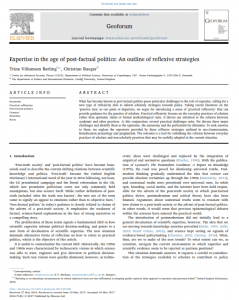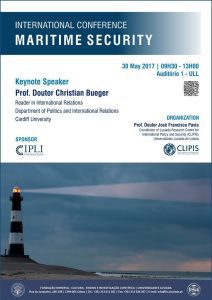On the 16th of June, I visited the Brussels School of International Studies of the University of Kent to attend the exam board. Since this year I am the external examiner of the School responsible for reviewing the master programmes in international relations. The school is providing a fantastic education and is rightfully known as the best UK school abroad in the field. Located in Europe’s capital Brussels, it gives students a unique learning experience in politics and law.
Author Archives: admin
Hosting EWIS in Cardiff
In the second week of June we had the pleasure to host the European Workshops of International Studies (EWIS) in Cardiff. EWIS is the second largest conference format of the European International Studies Association composed of dedicated workshops. 320 participants came for 25 workshops that covered themes from international security, global development, global health, to the politics of representation in museums. Continue reading
Expertise in the Age of Post-Factual Politics: New Article published
 In a newly published article titled “Expertise in the Age of Post-Factual Politics: An outline of reflexive strategies”, we discuss how we as academics might respond to the conditions of post-factual politics. In the article, co-authored with Trine Villumsen Berling and published in Geoforum, we argue that practical reflexivity allows for developing strategies. We draw on a range of social theorists (Gramsci, Bourdieu, Dewey, Rorty) that offer three outlines of practical reflexivity: The organic, collective and ironic strategy. Access the article here, or contact me by email if you want a copy.
In a newly published article titled “Expertise in the Age of Post-Factual Politics: An outline of reflexive strategies”, we discuss how we as academics might respond to the conditions of post-factual politics. In the article, co-authored with Trine Villumsen Berling and published in Geoforum, we argue that practical reflexivity allows for developing strategies. We draw on a range of social theorists (Gramsci, Bourdieu, Dewey, Rorty) that offer three outlines of practical reflexivity: The organic, collective and ironic strategy. Access the article here, or contact me by email if you want a copy.
Lecture in Lisbon
 On the 30th of May I am giving a lecture as the keynote of the International Conference on Maritime Security hosted by the Lusiada Research Centre for International Policy and Security, Universidade Lusíada de Lisboa. In the lecture titled “Situating Maritime Security” I discuss how the maritime security is related to the broader policy debates on ocean governance as well as international security. Drawing on earlier work on the concept of maritime security and the lessons from piracy, I argue that in particular the global maritime domain awareness structures and international capacity building efforts require further scrutiny.
On the 30th of May I am giving a lecture as the keynote of the International Conference on Maritime Security hosted by the Lusiada Research Centre for International Policy and Security, Universidade Lusíada de Lisboa. In the lecture titled “Situating Maritime Security” I discuss how the maritime security is related to the broader policy debates on ocean governance as well as international security. Drawing on earlier work on the concept of maritime security and the lessons from piracy, I argue that in particular the global maritime domain awareness structures and international capacity building efforts require further scrutiny.
Workshop on Maritime Crime in Stellenbosch
In May I attended the workshop “Combating Transnational Maritime Threats off Africa – through Collaborative Efforts in Policy Making, Law Enforcement, and Capacity Building”. The workshop was a joint initiative by the Security Institute for Governance and Leadership (SIGLA), Stellenbosch University, the Defense Threat Reduction Agency (DTRA) International Counterproliferation Program (ICP) and the Naval Criminal Investigative Service (NCIS) in cooperation with the US Embassy, South Africa.
The three-day workshop aimed at investigating the links between different maritime crimes and how these can be addressed through joint transnational responses. Representatives from South Africa, the US as well as a broad range of Eastern and West African countries participated in the event. In my talk I drew on the initial results of my BA funded research project SAFE SEAS and highlighted the importance of identifying synergies between development, security and environmental capacity building projects. I also argued that more efforts need to be made to ensure that coastal communities benefit from capacity building and are recognized as important actors in ensuring maritime security.
Maritime Crime Workshop in Copenhagen
I am attending a workshop titled “Maritime Crime beyond Piracy: Trends, Challenges and Interconnections” organized by the Centre for Military Studies of the University of Copenhagen. The goal of the workshop is to explore the relation between piracy and other maritime insecurities and how synergies between different areas of maritime security provision can be better developed. As part of the workshop, I am giving a talk that reflects on the recent resurgence of piracy off the coast of Somalia and how counter-piracy work, in particular, capacity building, can be better integrated into a broader maritime security architecture for the Western Indian Ocean region
Symposium on Practice Theory, Relationalism and Constructivism published
In a Symposium of International Studies Quarterly Online we discuss in what way constructivist International Relations theorizing is advanced or challenged by the rise of international practice theories and relationalism. The starting point is a theory note by David McCourt, who argued that practice theories and relationalism are the new IR constructivisms. In my response to that claim, I argue that practice theories have their own conceptual and methodological approaches and it hence doesn’t make any sense to subsume them under constructivism. Other contributors include Ted Hopf, Oliver Kessler, Stacie Goddard, Alex Montgomery, Cecelia Lynch, Ty Solomon and Swati Srivastava.
Visiting Project Partners in the Western Indian Ocean
In March I am visiting the project partners of SAFE SEAS in Eastern and Southern Africa. The goal is not only to deepen collaborations but to develop ideas in which directions to further advance the project. During my stay in the Seychelles, I have also held a strategy meeting with the current secretariat of the Contact Group on Piracy off the Coast of Somalia in order to prepare the next plenary meeting. In addition, I gave a talk in the forum title “Think big, but small is beautiful. Small Island Diplomacy”, organized by the Sir James Mancham International Center for Peace Studies and Diplomacy of the University of the Seychelles. In the talk titled “Creole Foreign Policy: The Seychelles and small state diplomacy” I investigated core insights from the small state literature, discussed the particular strengths of Seychelles and laid out three ideas of how the country can continue its success story. Other speakers were ambassador Barry Faure, and representatives from the Blue Economy Department and the Ministry of Foreign Affairs. The centre will publish a report on the forum in due course.
New Comment on the Return of Piracy
In a new op-ed published by The Conversation written with Robert McCabe, we discuss whether the recent hijacking of the ARIS 13 off the coast of Somalia implies a return of piracy. We argue that the incident should be understood as a warning signal and should remind us about the importance of taking the grievances of coastal communities seriously. It is available here.
ISA Conference in Baltimore
 From the 20th to 25th I will be attending the annual convention of the International Studies Association, Baltimore, US. The program kicks off with our next workshop of the Conceptualizing International Practices project. Over the next days I am scheduled to present or attend the following panels and events: Continue reading
From the 20th to 25th I will be attending the annual convention of the International Studies Association, Baltimore, US. The program kicks off with our next workshop of the Conceptualizing International Practices project. Over the next days I am scheduled to present or attend the following panels and events: Continue reading